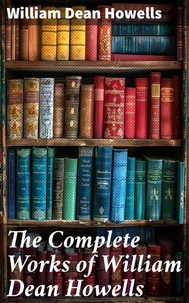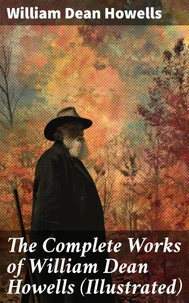The Minister's Charge; Or, The Apprenticeship of Lemuel Barker
Par :Formats :
Disponible dans votre compte client Decitre ou Furet du Nord dès validation de votre commande. Le format ePub est :
- Compatible avec une lecture sur My Vivlio (smartphone, tablette, ordinateur)
- Compatible avec une lecture sur liseuses Vivlio
- Pour les liseuses autres que Vivlio, vous devez utiliser le logiciel Adobe Digital Edition. Non compatible avec la lecture sur les liseuses Kindle, Remarkable et Sony
 , qui est-ce ?
, qui est-ce ?Notre partenaire de plateforme de lecture numérique où vous retrouverez l'ensemble de vos ebooks gratuitement
Pour en savoir plus sur nos ebooks, consultez notre aide en ligne ici
- Nombre de pages275
- FormatePub
- ISBN859-65--4732978-7
- EAN8596547329787
- Date de parution16/09/2022
- Protection num.Digital Watermarking
- Taille514 Ko
- Infos supplémentairesepub
- ÉditeurDIGICAT
Résumé
In "The Minister's Charge; Or, The Apprenticeship of Lemuel Barker, " William Dean Howells deftly explores the themes of personal growth, moral dilemmas, and societal expectations through the journey of its titular character, Lemuel Barker. Set against the backdrop of 19th-century America, Howells employs a realistic literary style characterized by nuanced characterizations and a focus on social realism.
The narrative intricately weaves together Barker's struggles as an apprentice to a minister, highlighting the tension between individual aspirations and communal obligations, whilst showcasing Howells' mastery of dialogue and psychological depth. William Dean Howells, often hailed as the "Dean of American Letters, " was an influential figure in the development of literary realism in the United States.
His experiences during the transformative period of the Gilded Age, combined with his upbringing in a modest household, undoubtedly informed his insightful portrayals of character and society. Howells was committed to depicting the complexities of everyday life, as evidenced in his own writings, leading him to create a narrative that addresses moral predicaments faced by those at the intersection of tradition and modernity.
This book is highly recommended for readers interested in the interplay between morality and personal agency within the framework of American society. Howells' work serves as an essential commentary on the pressures and paradoxes of religious and societal expectations, making it a vital read for those seeking a deeper understanding of personal and cultural identity in American literature.
The narrative intricately weaves together Barker's struggles as an apprentice to a minister, highlighting the tension between individual aspirations and communal obligations, whilst showcasing Howells' mastery of dialogue and psychological depth. William Dean Howells, often hailed as the "Dean of American Letters, " was an influential figure in the development of literary realism in the United States.
His experiences during the transformative period of the Gilded Age, combined with his upbringing in a modest household, undoubtedly informed his insightful portrayals of character and society. Howells was committed to depicting the complexities of everyday life, as evidenced in his own writings, leading him to create a narrative that addresses moral predicaments faced by those at the intersection of tradition and modernity.
This book is highly recommended for readers interested in the interplay between morality and personal agency within the framework of American society. Howells' work serves as an essential commentary on the pressures and paradoxes of religious and societal expectations, making it a vital read for those seeking a deeper understanding of personal and cultural identity in American literature.
In "The Minister's Charge; Or, The Apprenticeship of Lemuel Barker, " William Dean Howells deftly explores the themes of personal growth, moral dilemmas, and societal expectations through the journey of its titular character, Lemuel Barker. Set against the backdrop of 19th-century America, Howells employs a realistic literary style characterized by nuanced characterizations and a focus on social realism.
The narrative intricately weaves together Barker's struggles as an apprentice to a minister, highlighting the tension between individual aspirations and communal obligations, whilst showcasing Howells' mastery of dialogue and psychological depth. William Dean Howells, often hailed as the "Dean of American Letters, " was an influential figure in the development of literary realism in the United States.
His experiences during the transformative period of the Gilded Age, combined with his upbringing in a modest household, undoubtedly informed his insightful portrayals of character and society. Howells was committed to depicting the complexities of everyday life, as evidenced in his own writings, leading him to create a narrative that addresses moral predicaments faced by those at the intersection of tradition and modernity.
This book is highly recommended for readers interested in the interplay between morality and personal agency within the framework of American society. Howells' work serves as an essential commentary on the pressures and paradoxes of religious and societal expectations, making it a vital read for those seeking a deeper understanding of personal and cultural identity in American literature.
The narrative intricately weaves together Barker's struggles as an apprentice to a minister, highlighting the tension between individual aspirations and communal obligations, whilst showcasing Howells' mastery of dialogue and psychological depth. William Dean Howells, often hailed as the "Dean of American Letters, " was an influential figure in the development of literary realism in the United States.
His experiences during the transformative period of the Gilded Age, combined with his upbringing in a modest household, undoubtedly informed his insightful portrayals of character and society. Howells was committed to depicting the complexities of everyday life, as evidenced in his own writings, leading him to create a narrative that addresses moral predicaments faced by those at the intersection of tradition and modernity.
This book is highly recommended for readers interested in the interplay between morality and personal agency within the framework of American society. Howells' work serves as an essential commentary on the pressures and paradoxes of religious and societal expectations, making it a vital read for those seeking a deeper understanding of personal and cultural identity in American literature.






